Cycle Route Château-Thierry - Saint-Germain-la-Ville
No. of cycle route V52
Actions
![]()
Please wait - map data are loading
Added on 11 Feb 2012,
on 06 Dec 2020
Actions
Cycle route metrics
Total distance in km
97
Information about rights to the gps-track data | |
|---|---|
Rights owner | OpenStreetMap and Contributors + biroto-Redaktion (biroto.eu) |
Rights characteristic / license | Contains information from OpenStreetMap, which is made available here under the Open Database License(ODbL) |
Link to the description of the license | |
GPX file taken from | |
GPX file uploaded | by biroto-Redaktion on 06 Dec 2020
|
Track points in total
1.061
Track points per km (avg)
11
Start/endpoint
Start location
Château-Thierry, Nord-Pas-de-Calais and Picardy, FR (59 m NHN)
End location
Saint-Germain-la-Ville, Grand Est, FR (86 m NHN)
Beds4Cyclists, worth visiting and infrastructure
Name and address
Latitude / Longitude
Phone
Fax
Mobile
Type of accommodation
Rating for cyclists
Route km
Dist. to route
Elevation
2 km
0,1 km
71 m
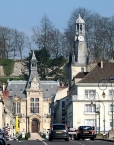
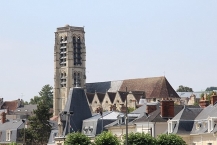
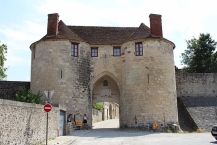
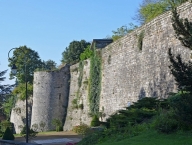
Château-Thierry ist eine Stadt im französischen Département Aisne in der Region Hauts-de-France (historische Region: Picardie). Die Stadt ist der Sitz einer Unterpräfektur für die Omois genannte Gegend, die inzwischen zum Weinbaugebiet der Champagne (Champagne viticole délimitée) gehört.
Hintergrund
Die im Gebiet der Marneschlachten des Ersten Weltkriegs an dem Fluss Marne auf halbem Weg zwischen Paris und Reims gelegene Kleinstadt führt ihren Namen in der lokalen Tradition auf den merowingischen Frankenkönig Theuderich IV. (Thierry IV.) zurück. Der Dichter Jean de La Fontaine wurde 1621 hier geboren. Bis zur Französischen Revolution gehörte die Stadt zur Champagne. Südlich von Château-Thierry kam im Ersten Weltkrieg im September 1914 die deutsche Front zum Stehen («Wunder an der Marne»). Auch im Frühjahr 1940 war die Gegend Kriegsschauplatz.
Sehenswürdigkeiten
- ⊙Château
. Die Anlage der Burg (heute Grünanlage) betritt man über die Porte Saint-Jean aus dem 14. Jahrhundert. Die Anlage bietet gute Ausblicke auf die Stadt und das Tal der Marne. Die frühere Anlage wird von einem Plan auf dem Turm Tour de Bouillon dargestellt.
- ⊙Porte Saint-Pierre
. Stadttor.
- ⊙Musée du Trésor de l’hôtel-Dieu, Rue du Château 11. ☎ +33 323 843286 . Museum. Preis: 8 €. Letzte Änderung: Jan. 2017.
- ⊙Musée Jean-de-La-Fontaine (musée Jean de La Fontaine), Rue Jean-de-la-Fontaine 12. ☎ +33 323 690560
. Museum. Im Moment wegen Umbau geschlossen (Stand: Okt 22).
- ⊙Champagnerkellerei Pannier, Rue Roger-Catillon. ☎ +33 323 695133. Preis: 10 €. Letzte Änderung: Jan. 2017.
- ⊙Hôtel de Ville (Das Rathaus aus dem 19. Jahrhundert), place de l'Hôtel-de-ville
.
- ⊙Église Saint-Crépin
. Kirche aus dem 15. bis 19. Jahrhundert.
Information about copyright | |
|---|---|
Rights characteristic / license | by-sa: CREATIVE COMMONS Attribution-ShareAlike |
Link to the description of the license | |
Input taken over from: |
Wikivoyage-Bearbeiter, 'Château-Thierry', Wikivoyage, 8. August 2023, 15:33 UTC, https://de.wikivoyage.org/w/index.php?title=Ch%C3%A2teau-Thierry&oldid=1558839 |
taken over / edited on | 21 Sep 2023
|
taken over / edited by |
|
19 km
1,1 km
96 m
36 km
2,6 km
78 m
43 km
1,7 km
166 m
44 km
1,2 km
117 m
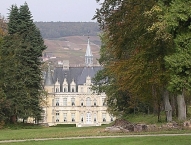
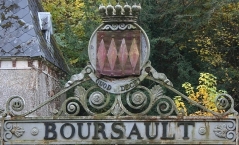
The Château de Boursault is a neo-Renaissance château in Boursault , Marne, France. It was built between 1843 and 1850 by Madame Clicquot Ponsardin, the Veuve Clicquot (Cliquot Widow) who owned the Veuve Clicquot champagne house. After being sold by her heir it was used as a military hospital in the first and second world wars. Today the Château de Boursault brand of champagne is made from grapes grown in the vineyards around the château and is aged in its cellars.
The present Château de Boursault was built by Madame Clicquot Ponsardin (1777–1866), founder of the Veuve Clicquot Champagne house, in honor of the marriage of her granddaughter Marie Clémentine de Chevigné to Louis de Mortemard-Rochechouard in 1839. It replaced the old castle of the barons of Boursault. Construction began in 1843 and was completed in 1850. Madame Veuve Clicquot retired to the château at the age of 64 and died there when she was 89.
Anne de Rochechouart de Mortemart (1847–1933), Duchess of Uzès, inherited the chateau on Madame Clicquot's death in 1866. She was the daughter of Marie Clémentine and Louis. The Duchess sold the property in 1913. It was used as a military hospital in World War I (1914–18) and again during World War II (1939–45). The park was converted to vineyards for production of champagne. The "Château de Boursault" brand of champagne continues to be made in the chateau and aged in its cellars. It is the only champagne with the "chateau" denomination in Marne.
Building
The château was built by the architect Jean-Jacques Arveuf-Fransquin (1802–76). It was located on the wooded summit of a hill planted with vines, and dominates the surrounding countryside and the village of Boursault. It was set in a magnificent park covering 11 hectares (27 acres). The chateau was designed in a Neo-Renaissance style. The building was designed for formal receptions. It has monumental architecture with a high roof. The windows are heavily decorated. It resembles the Château de Chambord , but has many more fireplaces. An 1882 description said "This beautiful residence contains all the riches of modern art, and attests to the generous and intelligent efforts of the princes of finance and industry to maintain the national taste at the level of its ancient traditions."
Information about copyright | |
|---|---|
Rights characteristic / license | by-sa: CREATIVE COMMONS Attribution-ShareAlike |
Link to the description of the license | |
Input taken over from: |
Wikipedia contributors, 'Château de Boursault', Wikipedia, The Free Encyclopedia, 24 May 2015, 11:21 UTC, <http://en.wikipedia.org/w/index.php?title=Ch%C3%A2teau_de_Boursault&oldid=663788320> [accessed 3 June 2015] |
taken over / edited on | 03 Jun 2015
|
taken over / edited by |
|
![]()
